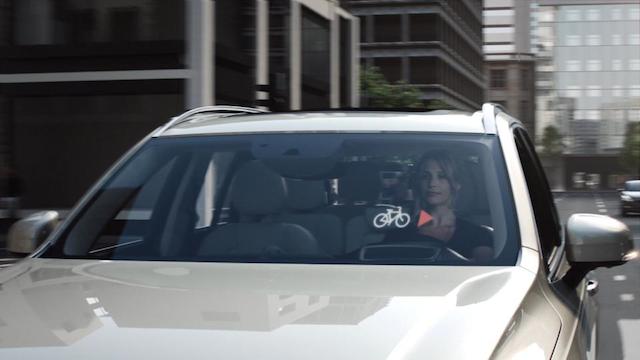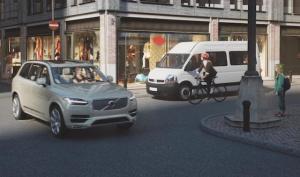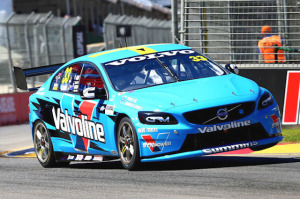
Volvo is about to demonstrate helmet-mounted technology that aims to reduce collisions between cars and cyclists.
The two-way communications technology is integrated into both the helmet and the car’s safety warning systems and was developed with fellow Swedish companies Ericsson and sports gear-maker POC.
Volvo will use its new XC90 sports utility vehicle to show off the system at next month’s International Consumer Electronics Show in Las Vegas.

It works via a smartphone app and Volvo’s cloud-based database and plots the cyclist and car’s exact positions. If it predicts a collision, the driver of the car will be warned of the bike’s presence via a heads-up display, shown here on the windscreen of the XC90. The rider will also get a visible warning through a helmet-mounted warning light.
Such technology already builds on the active safety systems in the new XC90, in particular the City Safe function that can detect, warn and automatically brake the car if sensors detect an oncoming collision with a cyclist.
Said Volvo Cars vice president Klas Bendrick: “The partnership between Volvo Cars, POC and Ericsson is an important milestone in investigating the next steps towards Volvo Cars’ vision to build cars that will not crash.

“But now, by exploring cloud-based safety systems, we are getting ever closer to eliminating the remaining blind spots between cars and cyclists and by that avoid collisions.”
The World Health Organisation (WHO) reported that in some countries cyclists and pedestrians constitute over 75% of road deaths.
Said Ericsson vice president Per Borgklint: “There is perhaps no greater promise that the networked society holds than its ability to create connections that save lives. Our latest work with Volvo Cars to explore protecting the millions of cyclists on the road is just the latest example of innovation that can change the world.”
- 132.3 million bicycles were sold worldwide in 2013
- In the Swedish city of Gothenburg alone, the number of cyclists went up by 30% in 2013
- 55% of cyclist deaths in European Union countries occur in urban areas
- 69% of cyclist deaths in the US occur in urban areas
- Serious injuries for UK cyclists in 2013 were 31% higher than in 2009
- In Germany, The Netherlands and Poland more than 85% of cyclist fatalities happen at crossroads
Meantime, Volvo is to adopt a new marketing strategy to focus more on online sales and move away from traditional sales avenues like motor shows and motorsport.

The ‘Volvo Way To Market’ will change the way Volvo has been doing business for many years. Said its senior marketing executive Alain Visser: “For decades, car marketing has been following a certain pattern which is followed by the entire car industry.
“Now, Volvo Cars chooses to defy that logic and implement a strategy that is geared towards its own needs. We don’t want to throw all existing marketing concepts overboard. Many of them exist for a good reason.
“We also don’t want to have the arrogance to say that we are better than all the rest. But we do have the self-confidence to say that we are different. So our way to market needs to be different as well.”
The change is likely to affect Volvo’s involvement in the Australasian V8 Supercar Championship. Nothing officially from Volvo yet, although it has said it will pull out of the Swedish Touring Car Championship. Ford has confirmed it will exit V8 Supercars at the end of next year
